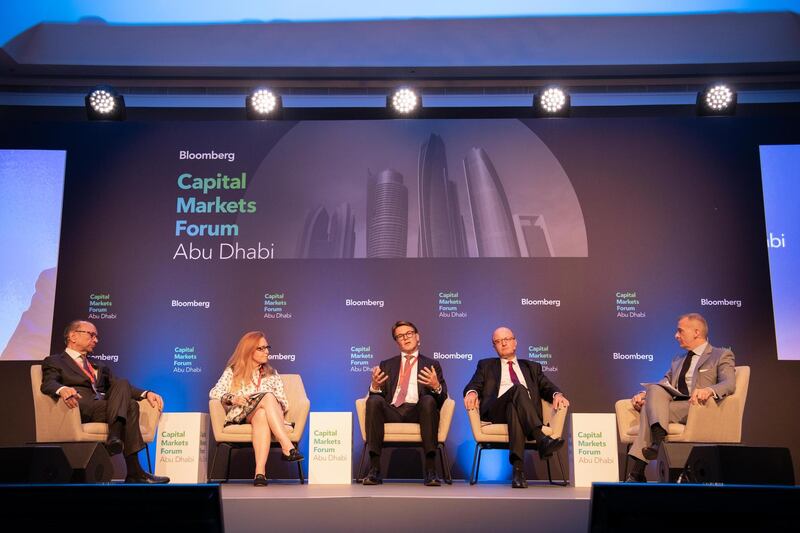Saudi Arabia's economic overhaul does not hinge on Saudi Aramco's initial public offering, but is linked to a diversification strategy that aims to incubate industries and promote self-sufficiency, bankers said.
The privatisation of the world’s biggest oil company is only one element of many of the steps of the kingdom's economic transformation process, and not the process itself, top regional bankers said.
“From the standpoint of Saudi Arabia, yes, they want to do it because they announced it [but] it’s not the single event [as] transformation is a process,” Martin Tricaud, group general manager and chief executive of HSBC for Middle East North Africa and Turkey region, said during a panel discussion at Bloomberg’s capital markets event in Abu Dhabi on Wednesday. “The whole opening up [of the economy] is a complex operation so yes [the IPO] will signal that something has happened but there a lot of other things that surround it.”
The public listing of Saudi Aramco, the world’s biggest oil producing company, will undeniably help strengthen the kingdom’s financial muscle, however, there are equally important elements to the country's overall economic reform agenda.
The kingdom’s Crown Prince Mohammed Bin Salman rolled out a slew of economic reforms to cut Saudi Arabia’s dependence on oil under the overarching Vision 2030 agenda. It included part privatisation of state-owned entities including Saudi Aramco whose 5 per cent listing is estimated to yield about $100 billion (Dh367bn) based on the government's $2 trillion valuation of the company.
The rebound in the price of oil from 2016 lows to $80 per barrel in the fourth quarter of last year and around $60 currently, has helped the government’s finances. However, Riyadh continues to pursue its transformation programme, which aims to curb subsidies, control government spending, develop a non-oil industrial base and generate alternative revenue lines through taxes and levies.
While a successful listing of Aramco, which could start trading on the kingdom’s bourse as soon as this year, will help the government raise additional finances, the kingdom is also advancing on other fronts.
“Across the Vision [2030] there are so many priorities,” Carmen Haddad, chief country officer for Citigroup in Saudi Arabia said. While the IPO has been in the limelight for a long time the structural changes, for example, increasing women’s participation in the workforce, are not getting enough publicity and are a "very big step in the right direction”.
The proceeds from the public listing, Ms Haddad said, will enable the kingdom’s sovereign wealth fund, the Public Investment Fund, to transform from being a local market investor to an international investor, allowing it to further diversify its portfolio across different assets classes.
“Other than that, I think [the overall] privatisation is a very important agenda under the realisation programme of the kingdom,” she said.
Attracting foreign direct investment is one of the key pillars of Saudi Arabia’s economic overhaul and market regulator, the Capital Market Authority, has implemented several structural and legislative changes over the past few years to open up the kingdom’s equities market to qualified foreign investors.
“The transformation in Saudi Arabia, the key one in my view, is the liberation of capital markets,” Sjoerd Leenart, global head of corporate banking & regional head, Central & Eastern Europe, Middle East and Africa at JP Morgan, said. “They moved in two to three years from a fairly closed market with 1 per cent of foreign [investors’] participation to being included in the FTSE and MSCI [indexes] and generating $22bn of inflows. Yes, it’s passive [investments] mostly, but it’s a great start in attracting capital flows,” he noted.







